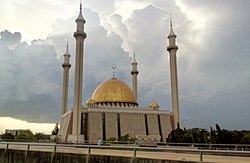
Back الإسلام في نيجيريا Arabic নাইজেরিয়ায় ইসলাম Bengali/Bangla Islam au Nigeria French Musulunci a Najeriya Hausa Islam di Nigeria ID Islam di Nigeria Malay Islam in Nigeria Dutch Islamismo na Nigéria Portuguese Ислам в Нигерии Russian Islam in Nigeria SIMPLE
The examples and perspective in this article may not include all significant viewpoints. (May 2014) |
 Abuja National Mosque, the national mosque of Nigeria | |
| Total population | |
|---|---|
47–54% of the population. |
| This article is part of a series in |
| Culture of Nigeria |
|---|
 |
| Islam by country |
|---|
 |
|
|
Islam is one of the major religions in Nigeria, with a history that spans over a millennium. While some scholars suggest that Islam was introduced to the region as early as the 9th century,[1]it is more commonly accepted that the religion began to take root in what is now modern-day Nigeria around the 11th century. The spread of Islam was primarily facilitated by trade routes across the Sahara and the influence of Muslim merchants and scholars.[2][3][4]
By the 19th century, the Sokoto Caliphate, founded through the Fulani Jihad led by Usman dan Fodio, established Islam as the predominant religion in northern Nigeria. The religion also spread to the southwest among the Yoruba through trade and cultural exchange.[5][6][7]
Islam remains a major religion in Nigeria today, practised by approximately 47–54% of the population.[8][9][10][11][12] The variance in estimations reflects the differences in survey methodologies and the absence of an official national religious census since 1963.[13][14]
The majority of Nigerian Muslims are Sunni (95%), predominantly following the Maliki school, with a small Shia minority (5%) concentrated in areas like Sokoto.[15]Sufi orders, such as Tijaniyya and Qadiriyya, are significant, with about 37% of Muslims identifying with Sufi groups.[16]
Islam predominates in northern Nigeria, particularly among the Hausa and Fulani, and has a strong presence among the Yoruba in the southwest.Higher fertility rates in Muslim-majority northern regions contribute to a projected increase in the Muslim population share by 2060.[13][17]
Since 1999, twelve northern states in Nigeria have gradually adopted Sharia law. Initially limited to civil matters such as marriage, divorce, and inheritance, the scope of Sharia was significantly expanded in 2000 to include criminal law, beginning with Zamfara State and followed by eleven others[18][19][17]
This expansion introduced punishments such as flogging, amputations, and stoning, sparking widespread criticism from human rights groups and raising concerns about compatibility with Nigeria’s secular constitution.[20][17][21][22][23]
- ^ Faga Terkimbi Edmund (September 2023). "The History of Islam in Nigeria and Its Effect on Nigerian Politics". Retrieved 15 May 2025.
- ^ "First religion to come into Nigeria". Pulse Nigeria. 14 May 2025. Retrieved 15 May 2025.
- ^ Junayd Greer (6 April 2022). "Islam in Nigeria: The Nigerian Saint who Established a Caliphate". Sacred Footsteps. Retrieved 15 May 2025.
- ^ Yushau Sodiq (Spring 1992). "A History of Islamic Law in Nigeria: Past and Present". Islamic Studies. 31 (1). Islamic Research Institute, International Islamic University, Islamabad: 85–108. JSTOR 20840064. Retrieved 15 May 2025.
- ^ "Western Africa: The jihad of Usman dan Fodio". Encyclopædia Britannica. Retrieved 2025-05-15.
- ^ "Usman dan Fodio". Encyclopædia Britannica. Retrieved 2025-05-15.
- ^ Hill, Linda (March 19, 2025). Sokoto Caliphate (eBook). Publifye AS. ISBN 9788235275400.
- ^ "Languages of Nigeria". Encyclopaedia Britannica. 29 April 2025. Retrieved 15 May 2025.
- ^ "The Future of World Religions: Population Growth Projections, 2010-2050". Pew Research Center. 2 April 2015. Retrieved 14 May 2025.
- ^ "Muslims". Pew Research Center. 2 April 2015. Retrieved 14 May 2025.
- ^ "Nigeria". CIA World Factbook. 2018. Retrieved 14 May 2025.
- ^ "Nigeria Round 9: Summary of Results" (PDF). Afrobarometer. 26 August 2022. Retrieved 14 May 2025.
- ^ a b McKinnon, Andrew (2021). "Christians, Muslims and Traditional Worshippers in Nigeria: Estimating the Relative Proportions from Eleven Nationally Representative Social Surveys". Review of Religious Research. 63 (2): 303–315. doi:10.1007/s13644-021-00450-5. Retrieved 14 May 2025.
- ^ "2022 Report on International Religious Freedom: Nigeria". U.S. Department of State. 2022. Retrieved 2025-05-14.
- ^ "2023 Report on International Religious Freedom: Nigeria". U.S. Department of State. 2024. Retrieved 14 May 2025.
- ^ "The World's Muslims: Unity and Diversity – Chapter 1: Religious Affiliation". Pew Research Center. 9 August 2012. Retrieved 14 May 2025.
- ^ a b c Shari'ah Criminal Law in Northern Nigeria: Implementation of Expanded Shari'ah Penal and Criminal Procedure Codes in Kano, Sokoto, and Zamfara States, 2017–2019 (PDF) (Report). United States Commission on International Religious Freedom. December 2019. Retrieved 14 May 2025.
- ^ "Political Shari'a"?: Human Rights and Islamic Law in Northern Nigeria – IV. The extension of Shari'a to criminal law in Nigeria (Report). Human Rights Watch. September 2004. Retrieved 14 May 2025.
- ^ "Political Shari'a"?: Human Rights and Islamic Law in Northern Nigeria (Report). Human Rights Watch. 21 September 2004. Retrieved 14 May 2025.
- ^ Country Report on Human Rights Practices 2001 – Nigeria (Report). United States Department of State. 4 March 2002. Retrieved 14 May 2025.
- ^ "Nigeria's blasphemy laws must be repealed, orders court". Open Doors UK & Ireland. 23 April 2025. Retrieved 15 May 2025.
- ^ "Catholic priest: "Caution in the application of Sharia in religiously mixed areas"". Agenzia Fides. 14 February 2025. Retrieved 15 May 2025.
- ^ "Court Declares Nigeria's Blasphemy Laws Violate International Human Rights Standards". International Christian Concern. 14 April 2025. Retrieved 15 May 2025.
© MMXXIII Rich X Search. We shall prevail. All rights reserved. Rich X Search